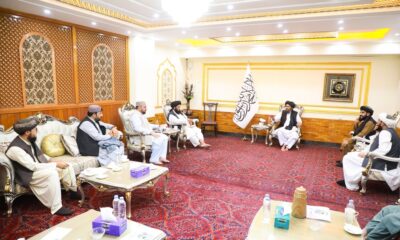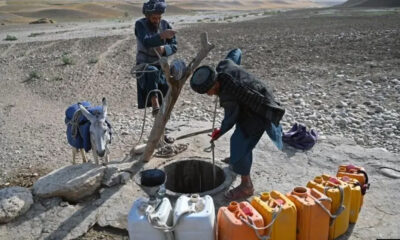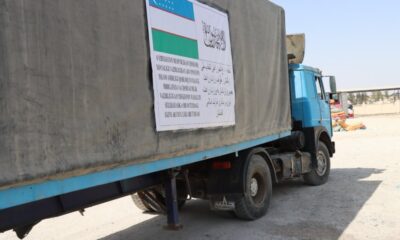Business
World Bank to push ahead with some Afghan projects

The World Bank has resumed work on three projects in Afghanistan focused on health, agriculture and livelihoods, but will maintain a hold on some $150 million for education projects, two sources familiar with the decision said Tuesday.
The multilateral development bank had put all four projects, valued at around $600 million, on hold in late March, citing its deep concerns over the Islamic Emirate’s ban on girls attending public high school.
Group of Seven partners and other major donors to the Afghanistan Reconstruction Trust Fund (ARTF) will meet to discuss the country’s mounting economic and food security problems on Friday during the spring meetings of the International Monetary Fund and the World Bank, the U.S. Treasury announced on Monday.
Some multilateral organizations, including the IMF, the United Nations Assistance Mission in Afghanistan (UNAMA) and the Islamic Development Bank, will also take part, one of the sources said.
When it halted work on the four programs, the World Bank noted that its policies required all ARTF-financed activities to support access to – and equity of services for – women and girls in Afghanistan.
Officials decided to “resume preparations” for the three non-education projects, valued at around $450 million, given the deepening economic crisis in Afghanistan worsened by rising food and energy prices triggered by Russia’s war in Ukraine, one of the sources said.
Russia calls its actions “a special military operation.”
The World Bank last week issued a dire outlook for Afghanistan’s economy, noting that per capita income had fallen by over a third in the last four months of 2021 following the seizure of power by the Islamic Emirate (IE) as U.S.-led foreign forces withdrew.
It said around 37% of Afghan households did not have enough money to cover food while 33% could afford food but nothing more.
When it agreed to free up ARTF funds for new projects to be implemented by U.N. agencies, the World Bank had stipulated that it expected a “strong focus on ensuring that girls and women participate and benefit from the support.”
The Islamic Emirate of Afghanistan (IEA) has unraveled gains in rights made by women during the last two decades, including restricting them from working and limiting their travel unless accompanied by a close male relative. Most girls were also barred from going to public school beyond seventh grade.
Business
US and China reach deal to temporarily slash tariffs, easing slump fears

The United States and China have agreed to temporarily slash reciprocal tariffs in a deal that surpassed expectations as the world’s two biggest economies seek to end a damaging trade war that has stoked fears of recession and roiled financial markets.
The U.S. will cut extra tariffs it imposed on Chinese imports in April this year to 30% from 145% and Chinese duties on U.S. imports will fall to 10% from 125%, the two sides said on Monday. The new measures are effective for 90 days, Reuters reported.
The dollar rose and stock markets lifted following the news, which helped allay concerns about a downturn triggered last month by U.S. President Donald Trump’s escalation of tariff measures aimed at narrowing the U.S. trade deficit.
“Both countries represented their national interest very well,” U.S. Treasury Secretary Scott Bessent said after talks with Chinese officials in Geneva. “We both have an interest in balanced trade, the U.S. will continue moving towards that.”
Striking a conciliatory tone towards China, Bessent was speaking alongside U.S. Trade Representative Jamieson Greer after the weekend talks in Switzerland in which both sides hailed progress on narrowing differences.
“The consensus from both delegations this weekend is neither side wants a decoupling,” Bessent said. “And what had occurred with these very high tariffs … was the equivalent of an embargo, and neither side wants that. We do want trade.”
The tariff dispute had brought nearly $600 billion in two-way trade to a standstill, disrupting supply chains, sparking fears of stagflation and triggering some layoffs.
The Geneva meetings were the first face-to-face interactions between senior U.S. and Chinese economic officials since Trump returned to power and launched a global tariff blitz, imposing particularly hefty duties on China.
Bessent said the deal did not include sector-specific tariffs and that the U.S. would continue strategic rebalancing in areas including medicines, semiconductors and steel where it had identified supply chain vulnerabilities.
The accord went further than many analysts had expected following weeks of confrontational rhetoric on trade.
“This is better than I expected. I thought tariffs would be cut to somewhere around 50%,” said Zhiwei Zhang, chief economist at Pinpoint Asset Management in Hong Kong.
“Obviously, this is very positive news for economies in both countries and for the global economy, and makes investors much less concerned about the damage to global supply chains in the short term,” Zhang added.
REPRIEVE
Since taking office in January, Trump had hiked the tariffs paid by U.S. importers for goods from China to 145%, in addition to those he imposed on many Chinese goods during his first term and the duties levied by the Biden administration.
China hit back by putting export curbs on some rare earth elements, vital for U.S. manufacturers of weapons and electronic consumer goods, and raising tariffs on U.S. goods to 125%.
Shares in European firms hit by the trade war rallied after the deal. Shipping company Maersk was the biggest gainer in Europe, up more than 12%. It warned last week that container volumes between the U.S. and China had plunged due to the dispute.
Meanwhile, shares in luxury firms LVMH and Gucci-owner Kering were up 7.4% and 6.7% respectively.
U.S. planemaker Boeing did not respond to requests for comment on how the deal would affect deliveries of aircraft to Chinese customers. In April, it said it was looking to resell potentially dozens of planes locked out of China by tariffs.
Wall Street stock futures climbed as the talks boosted hopes a global recession might be averted.
Trump gave a positive reading of the talks before they had concluded, saying the two sides had negotiated “a total reset… in a friendly, but constructive, manner.”
The president levied the tariffs in part after declaring a national emergency over fentanyl entering the United States, and Greer said conversations over curbing the deadly opioid were “very constructive” though on a separate track.
U.S. and Chinese officials met over two days at the Swiss U.N. ambassador’s gated villa overlooking Lake Geneva. Greer said many of the most challenging issues were settled outside, sitting on patio furniture beneath the shade of a tall tree.
“Having this setting, as opposed to … a sterile hotel conference situation or conference rooms, I think, let us develop personal relationships with our counterparts and lead to the successful conclusion,” he said.
Business
Pakistan’s exports to Afghanistan rise by over 64% in 9 months
Overall exports to Afghanistan were recorded at $623.285 million during July-March (FY2024-25) against exports of $378.922 million during the same period last year.
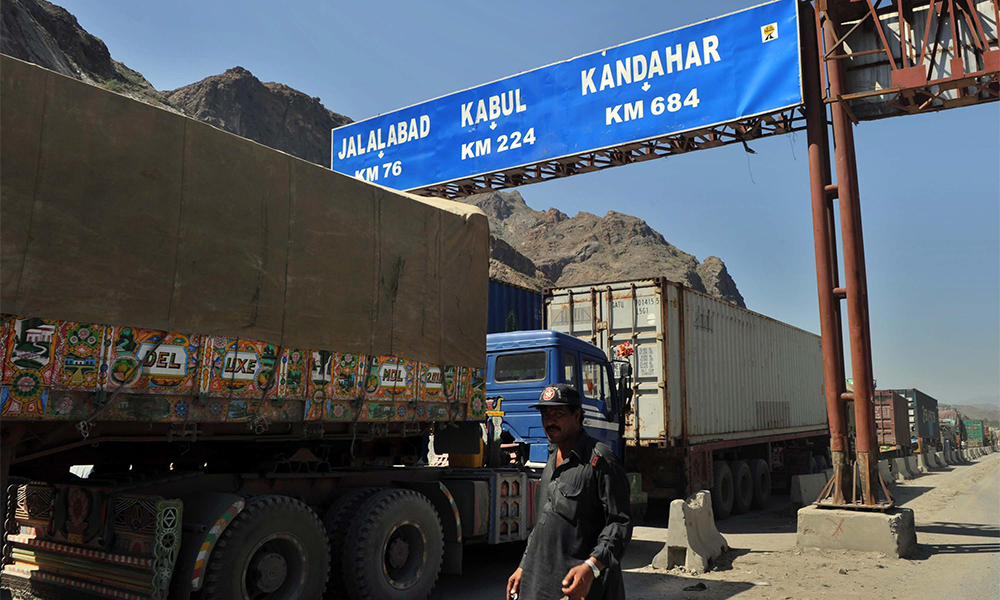
Pakistan has reported that its export of goods and services to Afghanistan witnessed an increase of 64.48 percent during the first nine months of the fiscal year (2024-25) as compared to the exports of the corresponding period of last year.
According to the State Bank of Pakistan (SBP), the overall exports to Afghanistan were recorded at $623.285 million during July-March (FY2024-25) against exports of $378.922 million during the same period last year.
On a year-on-year basis, the exports to Afghanistan decreased by 45.54 percent from $55.907 million in March 2024, against the exports of $30.445 million in March 2025.
On a month-on-month basis, the exports to Afghanistan also dipped by 15.37 percent during March 2025 as compared to the exports of $35.977 million in February 2025, the SBP data revealed.
On the other hand, the imports from Afghanistan into the country during the months under review were recorded at $20.127 million against $6.438 million last year, showing an increase of 212.62 percent in July-March (2024-25).
On a year-on-year basis, the imports from Afghanistan witnessed an increase of 99.79 percent, going up from $0.960 million in March 2024 against the imports of $1.918 million in March 2025.
On a month-on-month basis, the imports from Afghanistan into the country also witnessed a decrease of 36.23 percent during March 2025, as compared to the imports of $3.008m during February 2025, according to the data.
Business
Chinese company keen to invest $50 million in automobile industry in Afghanistan

Chinese automobile company Dongfeng has expressed an interest to invest $50 million in Afghanistan.
A representative of the company said in a meeting with Ahmadullah Zahid, Deputy Minister of Industry and Commerce, that the company wants to invest $50 million in the automobile manufacturing sector in Afghanistan in four phases over a period of three and a half years.
He added that with this investment, 2,000 vehicles will be manufactured per year.
Welcoming the company’s interest in investing in the country Ahmadullah Zahid, the Deputy Minister of Industry and Commerce, described Afghanistan as one of the safe and secure places for investment with favorable profits.
He assured the Chinese that all domestic and foreign investors will be treated equally and will be fully supported.
In the meeting, the representative of Dongfeng also emphasized that the company’s investment in Afghanistan will create jobs for 500 to 700 people in the country.
He said that the company’s products will include cars, trucks, ambulances, and buses.
-

 Regional5 days ago
Regional5 days agoIndia dismisses report of Pakistan downing jets as “disinformation”
-

 Sport5 days ago
Sport5 days agoAriana Television to broadcast 4th edition of Afghanistan Futsal Premier League
-
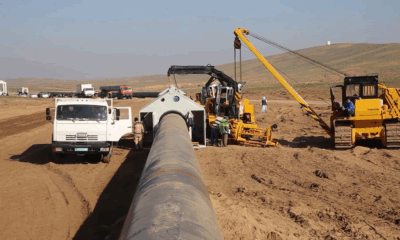
 Latest News4 days ago
Latest News4 days agoTAPI pipeline to reach Herat by end of 2025: Ministry
-
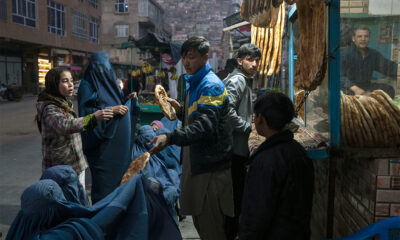
 Latest News5 days ago
Latest News5 days agoNearly one-third grapple with hunger in Afghanistan: WFP
-

 Sport4 days ago
Sport4 days agoIPL 2025: Dharamsala match abandoned due to security concerns
-
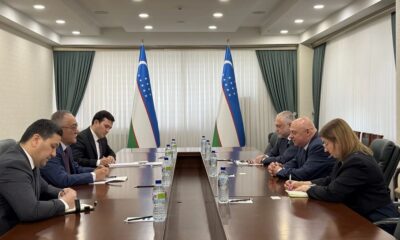
 Latest News5 days ago
Latest News5 days agoUzbekistan, Poland discuss cooperation over Afghanistan
-

 Regional4 days ago
Regional4 days agoIndia says military stations attacked by Pakistan drones and missiles
-
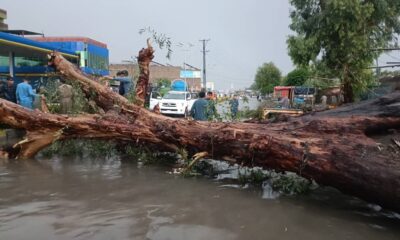
 Latest News4 days ago
Latest News4 days agoOne dead, dozens injured as powerful storm strikes Jalalabad, Afghanistan


